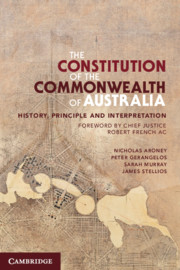The executive power of the Commonwealth … extends to the execution and maintenance of this Constitution, and of the laws of the Commonwealth.
Introduction
Section 61 of the Constitution declares that the ‘executive power of the Commonwealth’ is ‘vested in the Queen’ and that it ‘extends to the execution and maintenance’ of the ‘Constitution’ and the ‘laws of the Commonwealth’. The executive power of the Commonwealth is thus composed of several elements. Its exact content and ambit is one of the most pressing and complex issues in Australian constitutional law.
By declaring that the executive power is vested in the Queen, the framers of the Constitution understood that, subject to the Constitution, this incorporated the various powers customarily exercised by British monarchs as recognised by the common law. Andrew Inglis Clark put it this way:
[T]he supreme depositary of the executive authority in the Commonwealth is the King, and he possesses and may exercise within the Commonwealth all the prerogative rights and powers which are inherent in the … Crown. … [T]he Crown possesses prerogative rights and powers which have their source in the common law, and it is therefore evident that a portion of the common law attaches to the Constitution of the Commonwealth.
William Harrison Moore further maintained, without apparent qualification, that:
[w]here a power or duty committed to ‘the Commonwealth’ is of such a kind as is according to common law exerciseable by the Executive, the Commonwealth Executive is empowered to take such action as the common law allows.
The executive power of the Commonwealth extends to the ‘execution’ of the Constitution. This reinforces the primacy of the Constitution as the ultimate source of Commonwealth governmental authority within the federation. That the power also extends to the execution of Commonwealth laws reflects the principle, noted in Chapter 2, that the Constitution accords a certain normative priority to the role of the Parliament in legislating and holding the Executive Government to account, a role that is fundamental to responsible government and important in establishing the rule of law. This feature of the executive power also reflects the federal nature of the Constitution, for in this respect the power is limited to the execution of Commonwealth laws the subject matter of which is limited by ss 51 and 52 and 122.
